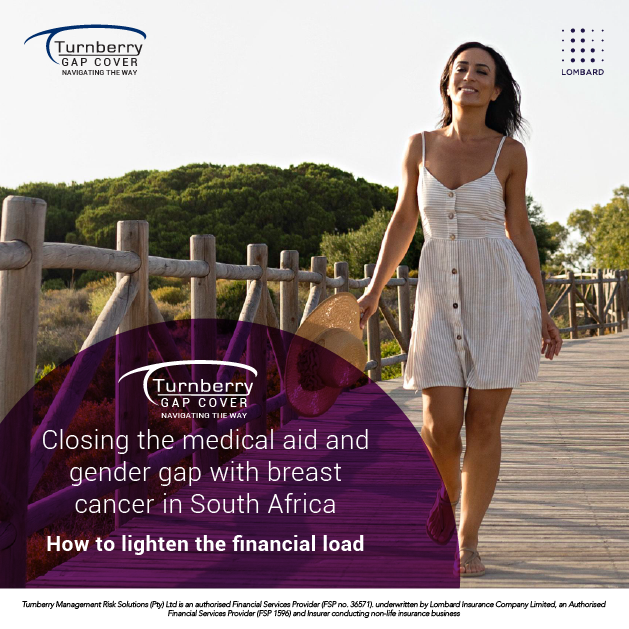
Brian Harris, General Manager of Operations at Turnberry Management Risk Solutions
Lifestyle and Tech – 1st October 2024
Breast cancer is a significant health issue in South Africa, being the most common cancer among women, with a lifetime risk of 1 in 27. However, while breast cancer predominantly affects women, it is crucial to acknowledge that men can also develop the disease, and awareness needs to span genders. Early detection is key in improving outcomes, but the financial implications of treatment can be significant, as many medical aid schemes do not fully cover the extensive costs associated with treatment, including surgeries, chemotherapy, and follow-up care. Having gap cover in place can significantly ease the burden of out-of-pocket expenses, providing peace of mind for patients and their families.
Incidence on the rise
The latest statistics from the National Cancer Registry (NCR) indicate that breast cancer remains the most prevalent cancer among women in South Africa. According to the 2022 NCR report, breast cancer accounted for 20.4% of all cancers diagnosed in females, with a significant increase in incidence rates over the years. Although not very common, men also get breast cancer; approximately 1% of all breast cancer cases occur in men, and this number is also increasing.
Steve Kelly, a male breast cancer survivor, has been cancer-free for five years. “In December 2018, my partner spotted a lump in my right breast. It was painless, and I did not feel ill. It was diagnosed as stage 3 grade 3 breast cancer. I had surgery the following week, followed by six months of chemotherapy and six weeks of radiation therapy,” he explains.
While Kelly is one of the lucky ones, the reality is that many men who receive a diagnosis of breast cancer are not, because it is typically diagnosed late, which increases the mortality rate and also means that treatment has to be more aggressive. The increasing prevalence of breast cancer, along with the challenges of late-stage diagnoses, underscores the importance of early detection and education. Initiatives aimed at promoting regular screenings and self-examinations are vital for improving outcomes for all individuals affected by breast cancer in South Africa, including men.
Awareness is crucial
“Men do not scan and are generally poor at self-examination. More significantly, research shows that up to 33% of men would not seek medical attention if they found a painless lump in their breast. Because of embarrassment or ignorance, men would often present later with a more advanced breast cancer and a worse prognosis,” Kelly says.
Awareness campaigns need to evolve to become more inclusive. However, they also need to evolve to effectively target women, given the growing prevalence of breast cancer as well as the fact that it is increasingly affecting women at younger ages. Regular self-examination is a critical element in the early detection of breast cancers in both women and men, and having appropriate testing in place is essential.
Joanne Stroebel is another breast cancer survivor, and she credits her early diagnosis and successful treatment to her healthy lifestyle and her regular self-screenings. “Have your screenings done regularly and make sure to self-examine at least once a month. Once you have been diagnosed, involve your medical aid broker (or get one that knows the systems) and let them help you with the claims. The healthcare system can be very daunting when you have a new diagnosis, and extra stress is the last thing you need,” she recommends.
Easing the financial strain
Having medical aid is important in covering the cost of breast cancer treatment, but the reality is that many medical aid schemes do not fully fund treatments. There are many areas where you could potentially incur out-of-pocket expenses. Surgery is typically involved, which often comes with shortfalls on doctors’ accounts, such as surgeons and anaesthetists.
Prophylactic bilateral mastectomy (the preventative removal of both breasts) is generally not covered, and neither is reconstruction. Making use of a doctor who is not in a Designated Service Provider (DSP) network means additional shortfalls and co-payments. Medical aids also cover cancer in one of two ways: they either have an annual limit for cancer treatment, and once this is depleted you will only have access to Prescribed Minimum Benefits (PMBs); or they will cover you up to a certain Rand value, and once this is depleted you will incur a 20% co-payment on anything related to oncology treatment as well as the treatment itself.
Gap cover can go a long way toward alleviating the financial burden of breast cancer treatment. If your medical aid pays a lump sum, once this is depleted, then gap cover can assist with funding ongoing treatment, including in-hospital as well as outpatient treatment, pathology, and biological drugs, if these were covered by your medical aid. Gap cover can also help to pay the 20% co-payment, which can add up to significant sums, especially around biological drugs.
“Nearly a quarter (23.3%) of all Turnberry cancer claims are for breast cancer, and the highest individual claim we have seen is in excess of R80,000 resulting in a total treatment cost of more than R170,000. This is not an outlying number either – individual claims are frequently in the tens of thousands of Rands, and total treatment cost is usually over R100,000,” says Brian Harris, GM: Operations at Turnberry Management Risk Solutions.
Stroebel concludes, “Being a medical aid specialist, I was fortunate that I had the best cover available for cancer treatment. I never thought that I would need to try and raise funds for treatment, as I was confident that my medical aid and gap cover would cover any shortfalls, which was absolutely the case. I also had a dread disease policy that paid out, and being financially secure meant I never had unnecessary stress. Talk to your broker to make sure you have the best cover to suit your needs.”
https://getcovered.turnberry.co.za/app/1
What is Gap Cover?
https://getcovered.turnberry.co.za/app/1
Client Testimonials
Turnberry assisted with claims for various incidents during the last few years – from an elective orthopaedic surgery for my young daughter to emergency surgeries for my wife. When my wife was diagnosed with cancer last year, the once-off payment assisted in a number of the out-of-hospital expenses. In addition, the knowledge that the expenses threshold is so much higher than the standard medical rates provided peace of mind. I have recommended Turnberry Gap Cover to our family, and reiterate that it is an essential or mandatory product. No healthy person believes critical or emergency procedures will happen. But the truth is that it can happen to anyone. The cost vs benefit is not a logical debate, without gap coverage you may end up selling assets to cover the bills. Turnberry’s services were professional, quick and efficient – ‘Peace of mind’. Mynhardt Oosthuizen
I have been a Turnberry Management Risk Solutions customer since 2016, after my financial advisor encouraged me to take out a gap cover plan to bolster my medical aid hospital plan. My plan gives me up to 600% cover for medical scheme shortfalls, which was a real blessing when I was diagnosed with a double pulmonary embolism in August 2020. I was in hospital for five days and saw numerous doctors. I had many tests done including x-rays, CT scans and MRIs. When I was discharged, the bills started to arrive, and each doctor had shortfalls that my hospital plan would not cover. Luckily, I had gap cover in place, and Turnberry took care of these shortfalls so that I could focus on my recovery. This was the first time I had claimed from my gap cover, but the relief of knowing that I had cover took away a lot of stress. My broker took me through the process and once I submitted all of the required documents, the claim was assessed and paid out within a few days. I then had to have a follow-up MRI with a co-payment which was not covered by my medical aid, and Turnberry again came to my aid. Going from healthy to hospitalised is not something you expect, but in reality, it can happen to anyone, and the last thing on your mind is how you will pay for the bills. I learned this the hard way when my mother was diagnosed with cancer and did not have medical aid or gap cover, and the financial pressure of trying to fund her treatment was enormous. This is a burden nobody should have to deal with, which is why gap cover is absolutely essential. Evy Michalopoulos, Founder & CEO of the Machi Filotimo Cancer Project
Cancer Lump Sum Payment has helped us hugely with all the incidental costs. Gap Cover is a ‘must have’. Christopher Cradock
Doctors charged above medical aid rates which required upfront co-payments. These co-payments were submitted to Turnberry for processing. My claim form was completed and submitted to my Broker on 29 June 2021. Payment of my 1st diagnosis of cancer was paid on 16 July 2021. On 9 July 2021, I received an email to advise that my claim was submitted to an assessor to conclude the assessment. Your timeous and prompt responses and feedback has assured me that Turnberry provides the best value for money which has benefitted me during my claim experience. I believe Turnberry provide a prompt, fast and efficient customer service and satisfaction. I would recommend Gap Cover which helps with the additional medical expenses. It covers the shortfall where Doctors and Hospitals charge above medical aid rate. The up-front co-payments for certain procedures and admission can be claimed from Gap Cover if you have the right benefit product in place. Excellent service. Highly recommended. Vijay Pillay
The claiming process was easy and painless. The claim was finalised quickly. This was a huge relief as, having been diagnosed with cancer, it was one less thing to worry about. Make sure that you have GAP cover. It could be the difference between being able to pay all your medical accounts and having to go into debt to cover the unexpected costs.
